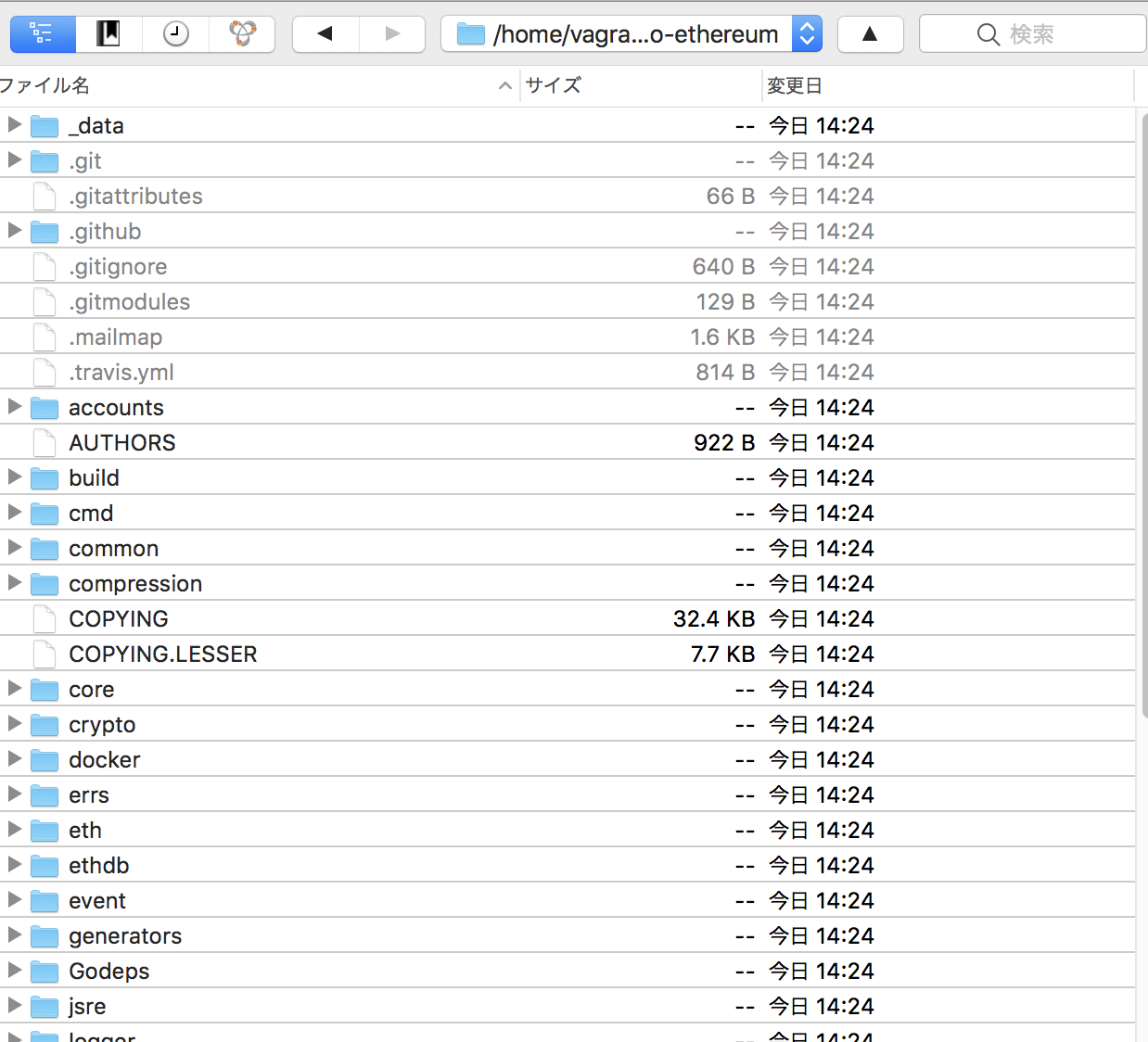スタートアップハブ Tokyoから、なんか手紙来た? と思ったら、quoカードだった^^
利用者アンケート。

こういうの当たったことないから嬉しい^^
スタートアップの空気感だと、Gaiaxとかもいい印象だけど、スタートアップハブもサービスいいね。
随机应变 ABCD: Always Be Coding and … : хороший
スタートアップハブ Tokyoから、なんか手紙来た? と思ったら、quoカードだった^^
利用者アンケート。

こういうの当たったことないから嬉しい^^
スタートアップの空気感だと、Gaiaxとかもいい印象だけど、スタートアップハブもサービスいいね。
OpenSSL
-> インターネット上で標準的に利用される暗号通信プロトコルであるSSLおよびTLSの機能を実装したオープンソースライブラリ
require 'openssl'
data = '*secret data*'
key = 'a' * 32
iv = 'i' * 16
enc = OpenSSL::Cipher.new('AES-256-CBC')
enc.encrypt
enc.key = key
enc.iv = iv
encrypted_data = enc.update(data) + enc.final
# print encrypted_data
dec = OpenSSL::Cipher.new('AES-256-CBC')
dec.decrypt
dec.key = key
dec.iv = iv
decrypted_data = dec.update(encrypted_data) + dec.final
print decrypted_data
vagrant@vagrant-ubuntu-trusty-64:~/bitcoin$ ruby main.rb
5????
g`??Ա?
vagrant@vagrant-ubuntu-trusty-64:~/bitcoin$ ruby main.rb
*secret data*
IntelのIvy Bridge以降のCPUやRaspberry Pi, Apple A7以降のプロセッサには、熱雑音を利用して物理的に乱数を発生させるハードウェア乱数生成器が備わっている
rubyの安全な乱数: securerandom
require 'securerandom' hex = SecureRandom.hex(32) print hex
vagrant@vagrant-ubuntu-trusty-64:~/bitcoin$ ruby main.rb
1fbd11b0d5588de19571e3679ee86387d2449b6d376f6211498e4dbd2557fabd
総量保存則
データ構造は、インプットとアウトプットという2つの領域で出来ている
複数存在することが可能
複式簿記と同様、インプットとアウトプットの総額は一致しないといけない
確実性の保証の為、トランザクションに対する会計監査が必ず一致しないといけない
通貨的価値が増減することはない為、通貨価値の総量保存則と呼んでいる
自制式三色簿記構造
トランザクションのアウトプットには、未使用状態と使用済み状態があり、未使用状態のアウトプットをUTXO(unspent transaction output)と呼ぶ
使用済みアウトプットは次のトランザクションのインプットから参照
トランザクションの手数料
送信者はマイナーに対して自分のトランザクションを優先的にブロックに取り込んでもらう為、手数料を支払う必要がある
インプットの総額とアウトプットの総額の差額が手数料
どのトランザクションをブロックに含めるかどうかはマイニングに成功したマイナー次第
-トランザクション手数料に関するパラメータのデフォルト値
txconfirmtarget: 2(block)
paytxfee: 0(BTC/kB)
fallbackfee: 0.0002 BTC/kB
maxtxfee: 0.10BTC
マイナーは受け取ったトランザクションをメモリープールに保管し、マイニングに成功するとブロックに格納する
ブロックサイズは固定
ハッシュチェーンという暗号技術とマイニングと呼ばれる計算競争が行われている
ハッシュチェーンは暗号学的ハッシュ関数を利用
1つのブロックには、平均10分間、数百から数千程度のトランザクションが格納
ブロック高0はジェネシス・ブロックと呼ばれる
マイニングの計算競争の難易度は、要する時間の平均が10分になるように自律的に調整されている
マイナーは中国を中心とする専門業者の独壇場になっている(10社程度でシェア90%)
通貨発行権はマイナーが持つ
公開鍵暗号を採用しており、ワレットをインストールすると、秘密鍵、公開鍵が生成されてワレットに登録される
最も長い枝が正統なブロックチェーンというルール
最新のブロックが接続するまでに何個のブロックが存在しているかの数を確認数という
$ sudo apt-get install git gcc build-essential libreadline-dev zlib1g-dev
$ sudo apt-get install libssl1.0-dev
$ git clone https://github.com/sstephenson/rbenv.git ~/.rbenv
$ echo ‘export PATH=”$HOME/.rbenv/bin:$PATH”‘ >> ~/.bash_profile
$ echo ‘eval “$(rbenv init -)”‘ >> ~/.bash_profile
$ exec $SHELL -l
vagrant@vagrant-ubuntu-trusty-64:~/bitcoin$ rbenv -v
rbenv 1.1.2-11-gc46a970
vagrant@vagrant-ubuntu-trusty-64:~/bitcoin$ rbenv install 2.0.0-p643
Downloading ruby-2.0.0-p643.tar.bz2…
-> https://cache.ruby-lang.org/pub/ruby/2.0/ruby-2.0.0-p643.tar.bz2
Installing ruby-2.0.0-p643…
WARNING: ruby-2.0.0-p643 is past its end of life and is now unsupported.
It no longer receives bug fixes or critical security updates.
Installed ruby-2.0.0-p643 to /home/vagrant/.rbenv/versions/2.0.0-p643
vagrant@vagrant-ubuntu-trusty-64:~/bitcoin$ rbenv rehash
vagrant@vagrant-ubuntu-trusty-64:~/bitcoin$ rbenv versions
* system (set by /home/vagrant/.rbenv/version)
2.0.0-p643
vagrant@vagrant-ubuntu-trusty-64:~/bitcoin$ rbenv global 2.0.0-p643
vagrant@vagrant-ubuntu-trusty-64:~/bitcoin$ ruby -v
ruby 2.0.0p643 (2015-02-25 revision 49749) [x86_64-linux]
vagrant@vagrant-ubuntu-trusty-64:~/bitcoin$ bitcoin-cli getconnectioncount
error: Could not connect to the server 127.0.0.1:8332
Make sure the bitcoind server is running and that you are connecting to the correct RPC port.
vagrant@vagrant-ubuntu-trusty-64:~/bitcoin$ bitcoind -daemon
Bitcoin server starting
vagrant@vagrant-ubuntu-trusty-64:~/bitcoin$ bitcoin-cli getconnectioncount
6
接続しているpeerの情報も見れる。
vagrant@vagrant-ubuntu-trusty-64:~/bitcoin$ bitcoin-cli getpeerinfo
[
{
“id”: 0,
“addr”: “82.195.237.253:8333”,
“addrlocal”: “106.154.137.22:64472”,
“addrbind”: “10.0.2.15:37006”,
“services”: “000000000000040d”,
“relaytxes”: true,
“lastsend”: 1572482905,
“lastrecv”: 1572482905,
“bytessent”: 1002038,
“bytesrecv”: 113691047,
“conntime”: 1572482645,
“timeoffset”: 0,
“pingtime”: 0.359843,
“minping”: 0.359843,
“version”: 70015,
“subver”: “/Satoshi:0.18.0/”,
“inbound”: false,
“addnode”: false,
“startingheight”: 601714,
“banscore”: 0,
“synced_headers”: 601716,
“synced_blocks”: 40376,
“inflight”: [
40404,
40411,
40416,
40447,
40451,
40463,
40464,
40465,
40466,
40472,
40480,
40485,
40499,
40519,
40523,
40524
],
“whitelisted”: false,
“bytessent_per_msg”: {
“addr”: 55,
“feefilter”: 32,
“getaddr”: 24,
“getdata”: 304889,
“getheaders”: 696606,
“ping”: 96,
“pong”: 96,
“sendcmpct”: 66,
“sendheaders”: 24,
“verack”: 24,
“version”: 126
},
“bytesrecv_per_msg”: {
“addr”: 30247,
“block”: 1261801,
“feefilter”: 32,
“getheaders”: 1053,
“headers”: 112377726,
“inv”: 19756,
“ping”: 96,
“pong”: 96,
“sendcmpct”: 66,
“sendheaders”: 24,
“verack”: 24,
“version”: 126
}
},
{
“id”: 7,
“addr”: “70.123.51.122:8333”,
“addrlocal”: “106.154.137.22:64482”,
“addrbind”: “10.0.2.15:45234”,
“services”: “000000000000040d”,
“relaytxes”: true,
“lastsend”: 1572482905,
“lastrecv”: 1572482905,
“bytessent”: 470175,
“bytesrecv”: 18568584,
“conntime”: 1572482661,
“timeoffset”: 0,
“pingtime”: 0.248508,
“minping”: 0.248508,
“version”: 70015,
“subver”: “/Satoshi:0.18.1/”,
“inbound”: false,
“addnode”: false,
“startingheight”: 601715,
“banscore”: 0,
“synced_headers”: 601716,
“synced_blocks”: 40390,
“inflight”: [
40448,
40452,
40455,
40457,
40458,
40459,
40460,
40462,
40491,
40494,
40544,
40546,
40547,
40548,
40549,
40555
],
“whitelisted”: false,
“bytessent_per_msg”: {
“addr”: 110,
“feefilter”: 32,
“getaddr”: 24,
“getdata”: 360103,
“getheaders”: 109474,
“ping”: 96,
“pong”: 96,
“sendcmpct”: 66,
“sendheaders”: 24,
“verack”: 24,
“version”: 126
},
“bytesrecv_per_msg”: {
“addr”: 30137,
“block”: 1515686,
“feefilter”: 32,
“getheaders”: 1053,
“headers”: 16989937,
“inv”: 31307,
“ping”: 96,
“pong”: 96,
“sendcmpct”: 66,
“sendheaders”: 24,
“verack”: 24,
“version”: 126
}
},
{
“id”: 9,
“addr”: “188.194.53.187:8333”,
“addrlocal”: “106.154.137.22:64485”,
“addrbind”: “10.0.2.15:57228”,
“services”: “000000000000040d”,
“relaytxes”: true,
“lastsend”: 1572482905,
“lastrecv”: 1572482905,
“bytessent”: 295793,
“bytesrecv”: 17806963,
“conntime”: 1572482668,
“timeoffset”: 0,
“pingtime”: 0.544024,
“minping”: 0.544024,
“version”: 70015,
“subver”: “/Satoshi:0.18.0/”,
“inbound”: false,
“addnode”: false,
“startingheight”: 601715,
“banscore”: 0,
“synced_headers”: 601716,
“synced_blocks”: 40393,
“inflight”: [
40421,
40449,
40453,
40481,
40513,
40536,
40539,
40541,
40545,
40550,
40551,
40552,
40553,
40554,
40566,
40569
],
“whitelisted”: false,
“bytessent_per_msg”: {
“addr”: 55,
“feefilter”: 32,
“getaddr”: 24,
“getdata”: 185840,
“getheaders”: 109474,
“ping”: 64,
“pong”: 64,
“sendcmpct”: 66,
“sendheaders”: 24,
“verack”: 24,
“version”: 126
},
“bytesrecv_per_msg”: {
“addr”: 30222,
“block”: 754920,
“feefilter”: 32,
“getheaders”: 1053,
“headers”: 16989937,
“inv”: 30431,
“ping”: 64,
“pong”: 64,
“sendcmpct”: 66,
“sendheaders”: 24,
“verack”: 24,
“version”: 126
}
},
{
“id”: 10,
“addr”: “34.211.159.217:8333”,
“addrlocal”: “106.154.137.22:64486”,
“addrbind”: “10.0.2.15:37076”,
“services”: “000000000000040d”,
“relaytxes”: true,
“lastsend”: 1572482905,
“lastrecv”: 1572482905,
“bytessent”: 600482,
“bytesrecv”: 19067437,
“conntime”: 1572482669,
“timeoffset”: 0,
“pingtime”: 0.306789,
“minping”: 0.301101,
“version”: 70015,
“subver”: “/Satoshi:0.17.0/”,
“inbound”: false,
“addnode”: false,
“startingheight”: 601715,
“banscore”: 0,
“synced_headers”: 601716,
“synced_blocks”: 40387,
“inflight”: [
40473,
40482,
40486,
40511,
40512,
40514,
40515,
40520,
40525,
40526,
40529,
40531,
40533,
40534,
40535,
40537
],
“whitelisted”: false,
“bytessent_per_msg”: {
“addr”: 110,
“feefilter”: 32,
“getaddr”: 24,
“getdata”: 490474,
“getheaders”: 109474,
“ping”: 64,
“pong”: 64,
“sendcmpct”: 66,
“sendheaders”: 24,
“verack”: 24,
“version”: 126
},
“bytesrecv_per_msg”: {
“addr”: 30082,
“block”: 2015514,
“feefilter”: 32,
“getheaders”: 1053,
“headers”: 16989937,
“inv”: 30451,
“ping”: 64,
“pong”: 64,
“sendcmpct”: 66,
“sendheaders”: 24,
“verack”: 24,
“version”: 126
}
},
{
“id”: 11,
“addr”: “24.86.184.66:8333”,
“addrlocal”: “106.154.137.22:64526”,
“addrbind”: “10.0.2.15:33247”,
“services”: “000000000000040d”,
“relaytxes”: true,
“lastsend”: 1572482905,
“lastrecv”: 1572482905,
“bytessent”: 437167,
“bytesrecv”: 1929784,
“conntime”: 1572482769,
“timeoffset”: 0,
“pingtime”: 0.277844,
“minping”: 0.268512,
“version”: 70015,
“subver”: “/Satoshi:0.17.0.1/”,
“inbound”: false,
“addnode”: false,
“startingheight”: 601716,
“banscore”: 0,
“synced_headers”: 601716,
“synced_blocks”: 40390,
“inflight”: [
40454,
40505,
40506,
40516,
40518,
40521,
40527,
40530,
40538,
40540,
40542,
40543,
40556,
40558,
40561,
40565
],
“whitelisted”: false,
“bytessent_per_msg”: {
“addr”: 55,
“feefilter”: 32,
“getaddr”: 24,
“getdata”: 435635,
“getheaders”: 1053,
“ping”: 64,
“pong”: 64,
“sendcmpct”: 66,
“sendheaders”: 24,
“verack”: 24,
“version”: 126
},
“bytesrecv_per_msg”: {
“addr”: 30137,
“block”: 1884252,
“feefilter”: 32,
“getheaders”: 1053,
“headers”: 106,
“inv”: 13834,
“ping”: 64,
“pong”: 64,
“sendcmpct”: 66,
“sendheaders”: 24,
“verack”: 24,
“version”: 128
}
},
{
“id”: 13,
“addr”: “99.79.135.85:8333”,
“addrlocal”: “106.154.137.22:64537”,
“addrbind”: “10.0.2.15:56065”,
“services”: “0000000000000409”,
“relaytxes”: true,
“lastsend”: 1572482905,
“lastrecv”: 1572482905,
“bytessent”: 329279,
“bytesrecv”: 1443236,
“conntime”: 1572482803,
“timeoffset”: -1,
“pingtime”: 0.4799,
“minping”: 0.4799,
“version”: 70015,
“subver”: “/Satoshi:0.18.99/”,
“inbound”: false,
“addnode”: false,
“startingheight”: 601716,
“banscore”: 0,
“synced_headers”: 601716,
“synced_blocks”: 40390,
“inflight”: [
40500,
40502,
40503,
40507,
40508,
40509,
40510,
40517,
40522,
40557,
40559,
40560,
40562,
40563,
40564,
40567
],
“whitelisted”: false,
“bytessent_per_msg”: {
“feefilter”: 32,
“getaddr”: 24,
“getdata”: 327866,
“getheaders”: 1053,
“ping”: 32,
“pong”: 32,
“sendcmpct”: 66,
“sendheaders”: 24,
“verack”: 24,
“version”: 126
},
“bytesrecv_per_msg”: {
“addr”: 30082,
“block”: 1402751,
“feefilter”: 32,
“getheaders”: 1053,
“headers”: 106,
“inv”: 8907,
“ping”: 32,
“pong”: 32,
“sendcmpct”: 66,
“sendheaders”: 24,
“verack”: 24,
“version”: 127
}
},
{
“id”: 14,
“addr”: “144.76.136.19:8333”,
“addrlocal”: “106.154.137.22:64546”,
“addrbind”: “10.0.2.15:57609”,
“services”: “000000000000040d”,
“relaytxes”: true,
“lastsend”: 1572482905,
“lastrecv”: 1572482905,
“bytessent”: 185008,
“bytesrecv”: 823277,
“conntime”: 1572482832,
“timeoffset”: 0,
“pingtime”: 0.459487,
“minping”: 0.459487,
“version”: 70015,
“subver”: “/Satoshi:0.18.0/”,
“inbound”: false,
“addnode”: false,
“startingheight”: 601716,
“banscore”: 0,
“synced_headers”: 601716,
“synced_blocks”: 40356,
“inflight”: [
40467,
40469,
40470,
40471,
40474,
40475,
40476,
40477,
40478,
40483,
40487,
40489,
40492,
40495,
40497,
40498
],
“whitelisted”: false,
“bytessent_per_msg”: {
“addr”: 55,
“feefilter”: 32,
“getaddr”: 24,
“getdata”: 183540,
“getheaders”: 1053,
“ping”: 32,
“pong”: 32,
“sendcmpct”: 66,
“sendheaders”: 24,
“verack”: 24,
“version”: 126
},
“bytesrecv_per_msg”: {
“addr”: 30082,
“block”: 784172,
“feefilter”: 32,
“getheaders”: 1053,
“headers”: 106,
“inv”: 7528,
“ping”: 32,
“pong”: 32,
“sendcmpct”: 66,
“sendheaders”: 24,
“verack”: 24,
“version”: 126
}
},
{
“id”: 15,
“addr”: “95.216.40.83:8333”,
“addrlocal”: “106.154.137.22:64547”,
“addrbind”: “10.0.2.15:57602”,
“services”: “000000000000040d”,
“relaytxes”: true,
“lastsend”: 1572482905,
“lastrecv”: 1572482905,
“bytessent”: 178267,
“bytesrecv”: 744186,
“conntime”: 1572482834,
“timeoffset”: 0,
“pingtime”: 0.407235,
“minping”: 0.407235,
“version”: 70015,
“subver”: “/Satoshi:0.18.0/”,
“inbound”: false,
“addnode”: false,
“startingheight”: 601716,
“banscore”: 0,
“synced_headers”: 601716,
“synced_blocks”: 40394,
“inflight”: [
40456,
40461,
40468,
40479,
40484,
40488,
40490,
40493,
40496,
40501,
40504,
40528,
40532,
40568,
40570
],
“whitelisted”: false,
“bytessent_per_msg”: {
“addr”: 85,
“feefilter”: 32,
“getaddr”: 24,
“getdata”: 176769,
“getheaders”: 1053,
“ping”: 32,
“pong”: 32,
“sendcmpct”: 66,
“sendheaders”: 24,
“verack”: 24,
“version”: 126
},
“bytesrecv_per_msg”: {
“addr”: 30167,
“block”: 705406,
“feefilter”: 32,
“getheaders”: 1053,
“headers”: 106,
“inv”: 7118,
“ping”: 32,
“pong”: 32,
“sendcmpct”: 66,
“sendheaders”: 24,
“verack”: 24,
“version”: 126
}
}
]
regtestモードで起動してブロック生成する
vagrant@vagrant-ubuntu-trusty-64:~/bitcoin$ bitcoind -regtest -daemon
Bitcoin server starting
vagrant@vagrant-ubuntu-trusty-64:~/bitcoin$ bitcoin-cli -regtest generate 1
[
“18c1e609d11c30dbec70459f8d84f51448cbe83f442553f91c438e710b3bbb12”
]
Bitcoin Core: C++
L https://github.com/bitcoin/bitcoin
NBitcoin: C# .netプラットフォーム
L https://github.com/MetacoSA/NBitcoin
bitcoinj: Java ビットコインプロトコルを扱うライブラリ
L https://github.com/bitcoinj/bitcoinj
BitcoinJS: Javascript
L https://github.com/bitcoinjs/bitcoinjs-lib
btcd: Go 代替フルノードビットコインの実装
L https://github.com/btcsuite/btcd
bitcoin-ruby: Ruby
L https://github.com/lian/bitcoin-ruby
python-bitcoinlib: python
L https://github.com/petertodd/python-bitcoinlib
パッケージファイルからbitcoinをインストールします
vagrant@vagrant-ubuntu-trusty-64:~/bitcoin$ sudo apt-add-repository ppa:bitcoin/bitcoin
vagrant@vagrant-ubuntu-trusty-64:~/bitcoin$ sudo apt-get update
vagrant@vagrant-ubuntu-trusty-64:~/bitcoin$ sudo apt-get install bitcoind bitcoin-qt
vagrant@vagrant-ubuntu-trusty-64:~/bitcoin$ bitcoind -daemon
Bitcoin server starting
vagrant@vagrant-ubuntu-trusty-64:~/bitcoin$ bitcoin-cli getinfo
error code: -32601
error message:
getinfo
This call was removed in version 0.16.0. Use the appropriate fields from:
– getblockchaininfo: blocks, difficulty, chain
– getnetworkinfo: version, protocolversion, timeoffset, connections, proxy, relayfee, warnings
– getwalletinfo: balance, keypoololdest, keypoolsize, paytxfee, unlocked_until, walletversion
bitcoin-cli has the option -getinfo to collect and format these in the old format.
なに??
vagrant@vagrant-ubuntu-trusty-64:~/bitcoin$ bitcoin-cli getblockchaininfo
{
“chain”: “main”,
“blocks”: 35694,
“headers”: 601708,
“bestblockhash”: “000000009062077e217f362f93fda8db55cf0e35eb972356deef5717e2ae4347”,
“difficulty”: 1.305062131591525,
“mediantime”: 1264099851,
“verificationprogress”: 8.429550730434574e-05,
“initialblockdownload”: true,
“chainwork”: “00000000000000000000000000000000000000000000000000008e9262c37e60”,
“size_on_disk”: 9994385,
“pruned”: false,
“softforks”: [
{
“id”: “bip34”,
“version”: 2,
“reject”: {
“status”: false
}
},
{
“id”: “bip66”,
“version”: 3,
“reject”: {
“status”: false
}
},
{
“id”: “bip65”,
“version”: 4,
“reject”: {
“status”: false
}
}
],
“bip9_softforks”: {
“csv”: {
“status”: “defined”,
“startTime”: 1462060800,
“timeout”: 1493596800,
“since”: 0
},
“segwit”: {
“status”: “defined”,
“startTime”: 1479168000,
“timeout”: 1510704000,
“since”: 0
}
},
“warnings”: “”
}
ubuntuのgolangをアップデートします
vagrant@vagrant-ubuntu-trusty-64:~/ethereum$ go env
GOARCH=”amd64″
GOBIN=””
GOCHAR=”6″
GOEXE=””
GOHOSTARCH=”amd64″
GOHOSTOS=”linux”
GOOS=”linux”
GOPATH=””
GORACE=””
GOROOT=”/usr/lib/go”
GOTOOLDIR=”/usr/lib/go/pkg/tool/linux_amd64″
TERM=”dumb”
CC=”gcc”
GOGCCFLAGS=”-g -O2 -fPIC -m64 -pthread”
CXX=”g++”
CGO_ENABLED=”1″
vagrant@vagrant-ubuntu-trusty-64:~/ethereum$ sudo apt-get update
vagrant@vagrant-ubuntu-trusty-64:~/ethereum$ sudo apt-get install gcc make
vagrant@vagrant-ubuntu-trusty-64:~/ethereum$ sudo apt-get install golang-1.10
vagrant@vagrant-ubuntu-trusty-64:~/ethereum$ ls /usr/lib | grep go
go
go-1.10
gold-ld
vagrant@vagrant-ubuntu-trusty-64:~/ethereum$ cd /usr/bin
vagrant@vagrant-ubuntu-trusty-64:/usr/bin$ sudo mv go go_16
vagrant@vagrant-ubuntu-trusty-64:/usr/bin$ sudo mv gofmt gofmt_16
vagrant@vagrant-ubuntu-trusty-64:/usr/bin$ sudo ln -s /usr/lib/go-1.10/bin/go /usr/bin/go
vagrant@vagrant-ubuntu-trusty-64:/usr/bin$ sudo ln -s /usr/lib/go-1.10/bin/gofmt /usr/bin/gofmt
vagrant@vagrant-ubuntu-trusty-64:/usr/bin$ go version
go version go1.10.4 linux/amd64
OK^^
再度makeします
vagrant@vagrant-ubuntu-trusty-64:~/ethereum$ make -C go-ethereum geth
/usr/lib/go-1.10/pkg/tool/linux_amd64/link: -X flag requires argument of the form importpath.name=value
何いいいいいいいいいいいいい
ubuntuにgo言語実装のgo-ethereumを入れる
vagrant@vagrant-ubuntu-trusty-64:~$ mkdir ethereum
vagrant@vagrant-ubuntu-trusty-64:~$ ls
ethereum
vagrant@vagrant-ubuntu-trusty-64:~$ cd ethereum
vagrant@vagrant-ubuntu-trusty-64:~/ethereum$ sudo apt-get install -y build-essential libgmp3-dev golang
vagrant@vagrant-ubuntu-trusty-64:~/ethereum$ sudo apt-get install git
vagrant@vagrant-ubuntu-trusty-64:~/ethereum$ git version
git version 1.9.1
vagrant@vagrant-ubuntu-trusty-64:~/ethereum$ git clone -b release/1.3.6 https://github.com/ethereum/go-ethereum.git
おおお

vagrant@vagrant-ubuntu-trusty-64:~/ethereum$ make -C go-ethereum geth
make: Entering directory `/home/vagrant/ethereum/go-ethereum’
build/env.sh go install -v -ldflags ‘-X main.gitCommit bf324bd24be9036046e36c6248b2d7c31cce9eca’ ./cmd/geth
github.com/codegangsta/cli
github.com/ethereum/go-ethereum/rlp
# github.com/ethereum/go-ethereum/rlp
build/_workspace/src/github.com/ethereum/go-ethereum/rlp/encode.go:162: undefined: sync.Pool
github.com/ethereum/go-ethereum/crypto/ecies
github.com/ethereum/go-ethereum/crypto/sha3
github.com/ethereum/go-ethereum/crypto/randentropy
github.com/ethereum/go-ethereum/crypto/secp256k1
github.com/pborman/uuid
golang.org/x/crypto/pbkdf2
golang.org/x/crypto/ripemd160
golang.org/x/crypto/scrypt
github.com/ethereum/go-ethereum/logger/glog
github.com/ethereum/go-ethereum/params
github.com/hashicorp/golang-lru
github.com/rcrowley/go-metrics
github.com/syndtr/goleveldb/leveldb/util
github.com/syndtr/goleveldb/leveldb/cache
github.com/syndtr/goleveldb/leveldb/comparer
github.com/syndtr/goleveldb/leveldb/storage
github.com/syndtr/goleveldb/leveldb/errors
github.com/syndtr/goleveldb/leveldb/filter
github.com/syndtr/goleveldb/leveldb/iterator
github.com/syndtr/goleveldb/leveldb/journal
github.com/syndtr/goleveldb/leveldb/memdb
github.com/syndtr/goleveldb/leveldb/opt
github.com/syndtr/gosnappy/snappy
github.com/syndtr/goleveldb/leveldb/table
github.com/syndtr/goleveldb/leveldb
gopkg.in/karalabe/cookiejar.v2/collections/prque
github.com/ethereum/go-ethereum/event
gopkg.in/fatih/set.v0
github.com/huin/goupnp/httpu
github.com/huin/goupnp/scpd
github.com/huin/goupnp/soap
github.com/huin/goupnp/ssdp
golang.org/x/net/html/atom
golang.org/x/net/html
golang.org/x/text/transform
golang.org/x/text/encoding
golang.org/x/text/encoding/internal/identifier
golang.org/x/text/encoding/internal
golang.org/x/text/encoding/charmap
golang.org/x/text/encoding/japanese
golang.org/x/text/encoding/korean
golang.org/x/text/encoding/simplifiedchinese
golang.org/x/text/encoding/traditionalchinese
golang.org/x/text/encoding/unicode
golang.org/x/net/html/charset
github.com/huin/goupnp
# github.com/huin/goupnp
build/_workspace/src/github.com/ethereum/go-ethereum/Godeps/_workspace/src/github.com/huin/goupnp/goupnp.go:113: unknown http.Client field ‘Timeout’ in struct literal
github.com/jackpal/go-nat-pmp
github.com/ethereum/go-ethereum/event/filter
github.com/robertkrimen/otto/file
github.com/robertkrimen/otto/token
github.com/robertkrimen/otto/ast
github.com/robertkrimen/otto/dbg
github.com/robertkrimen/otto/parser
github.com/robertkrimen/otto/registry
github.com/robertkrimen/otto
github.com/rs/cors
github.com/peterh/liner
github.com/mattn/go-isatty
github.com/shiena/ansicolor
github.com/fatih/color
github.com/mattn/go-runewidth
github.com/nsf/termbox-go
github.com/gizak/termui
make: *** [geth] Error 2
make: Leaving directory `/home/vagrant/ethereum/go-ethereum’
vagrant@vagrant-ubuntu-trusty-64:~/ethereum$ go version
go version go1.2.1 linux/amd64
https://github.com/ethereum/go-ethereum
Building geth requires both a Go (version 1.10 or later) and a C compiler. You can install them using your favourite package manager. Once the dependencies are installed, run
あれ?
Ethereumは、Solidityなどチューリング完全(※)な拡張言語を備える
※ある計算メカニズムが万能チューリングマシンと同じ計算能力を持つとき、その計算モデルはチューリング完全という
M =
Ethereumネットワークでは、EVM(Ethereum Virtual Machine Code)によって記述、処理される。この高水準言語が「Solidity」
仮想通貨の単位はEther, それより下の単位も存在し、10^-8Etherが「Szabo」、10^-18Etherが「Wei」
Ethereumはスマートコントラクトそのものや実行履歴も記録する
マイニングを行うと、取引の実行として通貨の送金やスマートコントラクトに記述したプログラムを実行し、記録する
アカウント間のやり取りだけでなく、スマートコントラスト(取引記録)のやり取りが可能
スマートコントラクトの実行環境はEVM
EthereumクライアントはC++、Go、Pythonなどの実装があるが、Goが最も活発
え??? Goなの😅
必要なアプリケーション: go-ethereum
vagrant@vagrant-ubuntu-trusty-64:~/bitcoin/src/bitcoin$ sudo make install
Making install in src
make[1]: Entering directory `/home/vagrant/bitcoin/src/bitcoin/src’
make[2]: Entering directory `/home/vagrant/bitcoin/src/bitcoin/src’
make[3]: Entering directory `/home/vagrant/bitcoin/src/bitcoin’
make[3]: Leaving directory `/home/vagrant/bitcoin/src/bitcoin’
CXX libbitcoin_server_a-blockencodings.o
g++: internal compiler error: Killed (program cc1plus)
Please submit a full bug report,
with preprocessed source if appropriate.
See
make[2]: *** [libbitcoin_server_a-blockencodings.o] Error 4
make[2]: Leaving directory `/home/vagrant/bitcoin/src/bitcoin/src’
make[1]: *** [install-recursive] Error 1
make[1]: Leaving directory `/home/vagrant/bitcoin/src/bitcoin/src’
make: *** [install-recursive] Error 1
なに?????????
c++: internal compiler error: Killed (program cc1plus) はメモリが足りない??
メモリを増設するか、swap領域を確保するか。
メモリ増設だとvagrant fileか?
# config.vm.provider "virtualbox" do |vb| # # Display the VirtualBox GUI when booting the machine # vb.gui = true # # # Customize the amount of memory on the VM: # vb.memory = "1024" # end
現状を確認します。
swapは0Bか?
vagrant@vagrant-ubuntu-trusty-64:~/bitcoin/src/bitcoin$ cat /etc/fstab
LABEL=cloudimg-rootfs / ext4 defaults 0 0
vagrant@vagrant-ubuntu-trusty-64:~/bitcoin/src/bitcoin$ swapon -s
Filename Type Size Used Priority
vagrant@vagrant-ubuntu-trusty-64:~/bitcoin/src/bitcoin$ free -h
total used free shared buffers cached
Mem: 489M 209M 279M 720K 7.0M 37M
-/+ buffers/cache: 165M 324M
Swap: 0B 0B 0B
swapファイルを作成する
vagrant@vagrant-ubuntu-trusty-64:~/bitcoin/src/bitcoin$ sudo fallocate -l 2G /swapfile
vagrant@vagrant-ubuntu-trusty-64:~/bitcoin/src/bitcoin$ ls -lh /swapfile
-rw-r–r– 1 root root 2.0G Oct 28 14:21 /swapfile
vagrant@vagrant-ubuntu-trusty-64:~/bitcoin/src/bitcoin$ sudo chmod 600 /swapfile
vagrant@vagrant-ubuntu-trusty-64:~/bitcoin/src/bitcoin$ ls -lh /swapfile
-rw——- 1 root root 2.0G Oct 28 14:21 /swapfile
vagrant@vagrant-ubuntu-trusty-64:~/bitcoin/src/bitcoin$ sudo mkswap /swapfile
Setting up swapspace version 1, size = 2097148 KiB
no label, UUID=fa2787e1-8129-4685-9586-651f61fb0d8e
vagrant@vagrant-ubuntu-trusty-64:~/bitcoin/src/bitcoin$ sudo swapon /swapfile
vagrant@vagrant-ubuntu-trusty-64:~/bitcoin/src/bitcoin$ free -h
total used free shared buffers cached
Mem: 489M 211M 278M 720K 7.1M 38M
-/+ buffers/cache: 166M 323M
Swap: 2.0G 0B 2.0G
きたーーーーーーーーーー
で、もう一回、bitconfのディレクトリでmakeします。今度は行けるか?
あれ、もしかして来たか??